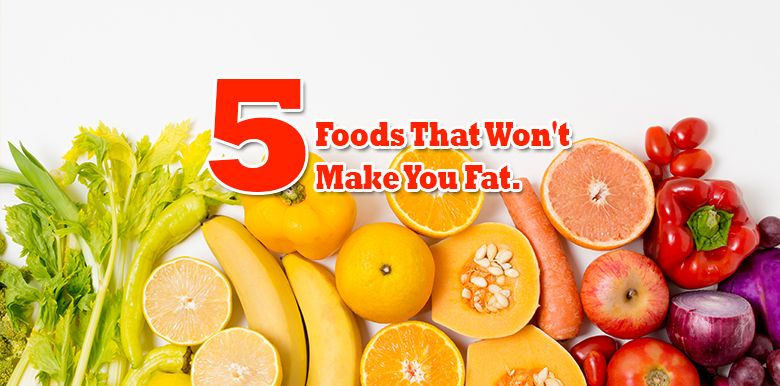Whether you’re housebound for the next couple of weeks from a COVID-19 quarantine, or simply trying to survive a work shutdown, you’ll likely be limiting or avoiding trips to the grocery store.
So you may be wondering: What are the best foods to buy when you know you’re going to be stuck at home — and is it even possible to consume a nutritious diet?
Filling foods tend to have the following qualities:
High volume: Studies indicate that the volume of food consumed strongly influences satiety. When foods contain a lot of water or air, the volume is increased without adding calories.
High protein: Studies show protein is more filling than carbs and fat. Diets higher in protein increase satiety and lead to lower overall calorie intake than lower-protein diets do.
High fiber: Fiber provides bulk and helps you feel full. It also slows the movement of food through your digestive tract, which keeps you feeling fuller for longer.
Low energy density: This means that a food is low in calories for its weight. Foods with low energy density can help you feel full for fewer calories.
So if you eat foods with the above characteristics, then you can usually eat them until fullness without getting in too many calories.
Now that everyone is sitting at home,.with no means to go to the gym or for a run, here is the list of 6 filling food that won’t make you fat in the lockdown –
1. Boiled Potatoes
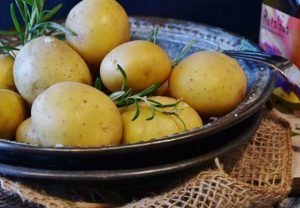
Boiled Potatoes
Due to their higher carb content, many people avoid potatoes when trying to lose weight, but they shouldn’t.
Whole potatoes are loaded with vitamins, fiber and other important nutrients. They also contain a certain type of starch called resistant starch.
Resistant starch contains half the calories of regular starch (2 instead of 4 calories per gram). In your digestive system, it acts a lot like soluble fiber, helping you feel full.
Because adding resistant starch to meals helps satisfy hunger, it causes people to eat fewer calories.
Interestingly, cooling potatoes after they’re cooked increases their resistant starch content. In fact, studies show that cooling and reheating potatoes multiple times continues to increase their hunger-suppressing effect.
In a study that measured the ability of 38 foods to satisfy hunger, boiled potatoes ranked the highest.
While boiled potatoes were the most satisfying food tested, fried potato chips were found to be three times less filling.
2. Whole Eggs

Whole eggs
Eggs are another food that has been unfairly demonized in the past. The truth is, eggs are incredibly healthy and high in several important nutrients.
Most of the nutrients, including about half of an egg’s protein, are found in the yolk.
Eggs are a complete protein, meaning they contain all nine essential amino acids.
In addition, they’re very filling.
Several studies found that people who ate eggs for breakfast were more satisfied and consumed fewer calories throughout the day than those who had a bagel for breakfast.
In particular, one study found that people who ate eggs for breakfast lowered their body mass index (BMI) and lost more weight than those who ate a bagel.
Eggs are a great source of nutrients, including high-quality protein. They may help you eat less for up to 36 hours after a meal.
3. Apples
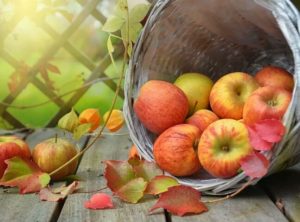
Apples
Fruits are an important part of a healthy diet.
Several studies indicate eating fruit is associated with lower calorie intake and can contribute to weight loss over time.
In particular, apples score very high on the satiety index.
Because apples contain pectin, a soluble fiber that naturally slows digestion, they help you feel full.
They are also over 85% water, which provides volume and improves satiety without adding calories.
It’s important to note that whole, solid fruit increases satiety more than puréed fruit or juice, both of which are not particularly filling.
One study looked at the effects of eating solid apple segments, applesauce or drinking apple juice at the beginning of a meal.
It found that those who ate solid apple segments consumed 91 fewer calories than those eating apple sauce and 150 fewer calories than those drinking apple juice.
Eating apple segments also resulted in higher fullness ratings and lower hunger ratings than other forms of fruit.
Apples are high in water and soluble fiber but low in calories. Eating whole, solid apples may help you consume fewer calories and contribute to weight loss over time.
4. Citrus Fruits
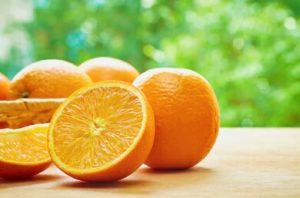
Citrus Fruits
Similarly to apples, citrus fruits are high in pectin, which can slow digestion and increase satiety.
They also have a high water content. Both oranges and grapefruit contain over 87% water, which means they’re able to fill you up for very few calories.
It has often been suggested that eating grapefruit can promote weight loss.
In one study, obese participants eating grapefruit lost significantly more weight than those given a placebo.
In another study, eating half a grapefruit three times daily at mealtimes for six weeks was associated with modest weight loss and a significant reduction in waist circumference.
When combined with calorie restriction, consuming grapefruit or grapefruit juice before meals resulted in a 7.1% weight loss, a significant reduction in body fat and weight circumference.
However, these results may not be exclusive to grapefruit, as drinking water before meals had similar effects.
5. Fish
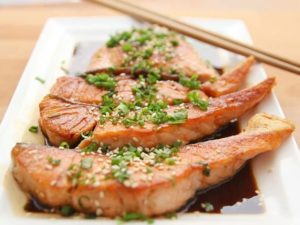
Fish
Fish that are rich in omega-3 fatty acids may increase satiety in people who are overweight or obese.
They’re also loaded with high-quality protein, which is known to be very filling.
In fact, fish scores higher than all other protein-rich foods on the satiety index and ranks second of all foods tested.
One study found the effect of fish on satiety was significantly greater than that of chicken and beef.
Another study found participants who ate fish consumed 11% fewer calories at their next meal than those who ate beef.
Fish is high in protein and omega-3 fatty acids, which may increase satiety. Fish may also be more filling than other types of protein such as chicken and beef.
Filling foods have certain characteristics. They’re high in volume, protein or fiber and low in energy density.
Including more of these foods in your diet may help you lose weight in this lockdown. Don’t forget to exercise at home occasionally to digest the food.
